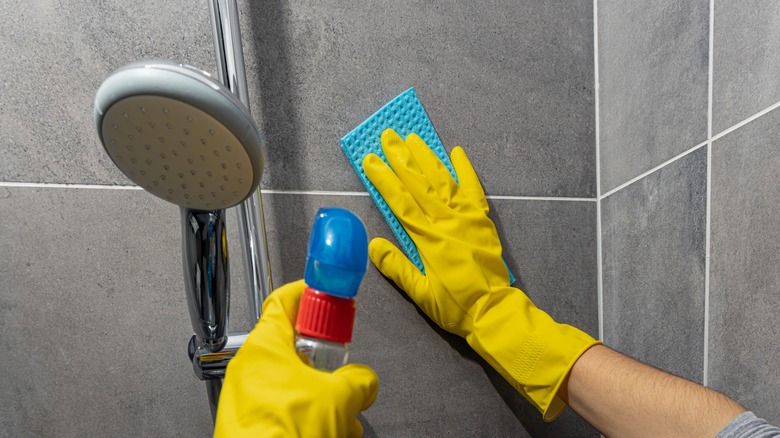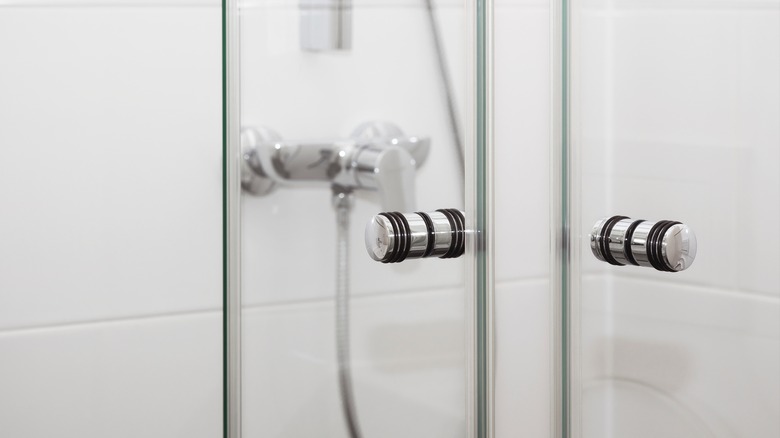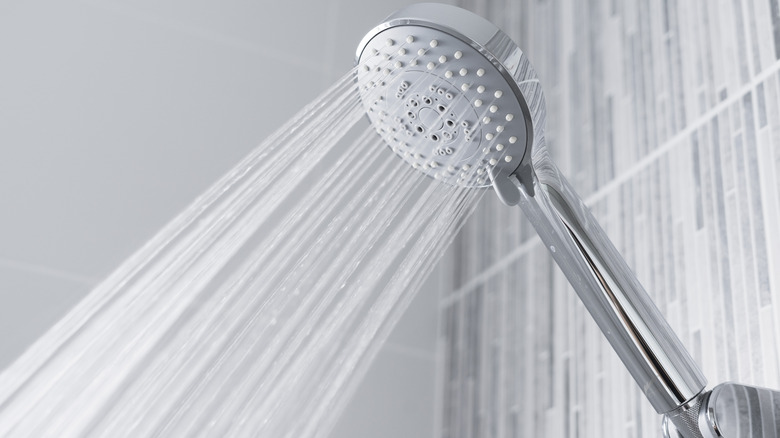Is Vinegar Strong Enough To Clean Your Shower?
As time goes on, your shower can become very grimy and dirty. If you don't take the time to clean it every now and then, you'll probably end up regretting it. Failing to clean your shower regularly can lead to significant staining as well as mold and mildew growth.
While cleaning your shower with store-bought shower cleaners is a common solution, there's a simpler option that you might not have considered: using white vinegar. There are many ways you can use vinegar to keep your house clean and it can be a great tool for cleaning a shower as well. Vinegar can be used to clean just about any part of the bathroom, including shower door tracks, sinks, toilets, and tiles (but never use it on marble or granite). It can kill bacteria and germs and also deodorize, eliminating foul smells. It's also affordable and environmentally friendly — it's biodegradable and breaks down easily.
Harsher chemicals and abrasive cleaning solutions can damage some parts of the shower, such as shower heads and taps that are made of stainless steel. Vinegar is a great alternative — it will give you the strength you need without causing damage. It's not as harsh as chemical cleaners, but its acidity provides enough strength to dissolve mineral deposits and oils. It works well to eliminate limescale and kill mold.
Cleaning shower walls and doors with vinegar
If you want to clean the walls of your shower or tub, you'll simply need to mix equal parts of warm water and distilled white vinegar in a spray bottle. You can also add some lemon for a fresh smell. Once you have your solution, spray the tub or shower walls and let it sit for at least 10 minutes. If there are any particularly tough stains or dirty spots, you can sprinkle a bit of baking soda on it as well for a little bit of an abrasive. Once you've applied the solution and let it sit a bit, rinse it with hot water and wipe it away using a sponge or a damp cloth that's scratch-resistant.
When cleaning a glass shower door or wall, keep in mind that Windex isn't the best option. Its ammonia content will potentially damage surroundings such as stainless steel components. To use vinegar instead, heat half a cup in the microwave for 30 seconds. Then, apply it to the glass and let it sit for about five minutes. You can then scrub it away using a soft bristle brush or sponge. Be sure to wear rubber gloves while doing so and ensure the brush is non-abrasive to avoid damage and scratching to the door. Finally, rinse the glass with warm water and follow this up by drying it with a microfiber cloth.
Cleaning other parts of the shower with vinegar
You can also clean ceramic and porcelain shower tiles with vinegar. To do so, use a 50-50 mixture of vinegar and warm water in a spray bottle. Scrub it into the tiles with a soft cloth. However, avoid using vinegar on stone and unsealed grout, since it can damage them. Rinse thoroughly when you're done.
To clean a shower head, it's ideal to remove it completely. Then, you can soak it in a bowl or bucket that's filled with vinegar. In most cases, you can leave it overnight to clean it. However, if the shower head is made from a material such as brass, nickel, or gold, you'll want to remove it after only 30 minutes have passed. Once you're done, rinse it thoroughly and let water go through every part of the shower head. You may want to add it back to the shower and then run water through it for five to 10 minutes to ensure it's been rinsed thoroughly.
When cleaning a shower drain, use both vinegar and baking soda together. First, pour hot water down the drain. Then, add half a cup of baking soda. Next, simply combine one cup of boiling water with one cup of vinegar. Add it to the drain and then plug it up with a rag or shower plug. Let the solution sit in the drain for at least 15 minutes before flushing it with hot water again.



